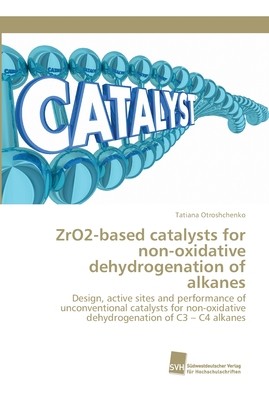
- We will send in 10–14 business days.
- Author: Tatiana Otroshchenko
- Publisher: Sudwestdeutscher Verlag Fur Hochschulschriften AG
- ISBN-10: 6202322640
- ISBN-13: 9786202322645
- Format: 15.2 x 22.9 x 1 cm, minkšti viršeliai
- Language: English
- SAVE -10% with code: EXTRA
ZrO2-based catalysts for non-oxidative dehydrogenation of alkanes (e-book) (used book) | bookbook.eu
Reviews
Description
Catalytic non-oxidative dehydrogenation of C3 - C4 alkanes is of increasing importance due to the growing demand for the corresponding olefins. Commercial catalysts with supported CrOx or Pt-Sn species have, however, shortcomings of being toxic or limited availability. Against this background, the present work was focused on the development of alternative dehydrogenation catalysts on the basis of metal oxides with usually unchangeable metal oxidation state but with high ability for lattice oxygen removal. The working hypothesis was that catalytically active sites can be lattice defects on the surface of such materials.
EXTRA 10 % discount with code: EXTRA
The promotion ends in 22d.15:52:45
The discount code is valid when purchasing from 10 €. Discounts do not stack.
- Author: Tatiana Otroshchenko
- Publisher: Sudwestdeutscher Verlag Fur Hochschulschriften AG
- ISBN-10: 6202322640
- ISBN-13: 9786202322645
- Format: 15.2 x 22.9 x 1 cm, minkšti viršeliai
- Language: English English
Catalytic non-oxidative dehydrogenation of C3 - C4 alkanes is of increasing importance due to the growing demand for the corresponding olefins. Commercial catalysts with supported CrOx or Pt-Sn species have, however, shortcomings of being toxic or limited availability. Against this background, the present work was focused on the development of alternative dehydrogenation catalysts on the basis of metal oxides with usually unchangeable metal oxidation state but with high ability for lattice oxygen removal. The working hypothesis was that catalytically active sites can be lattice defects on the surface of such materials.


Reviews